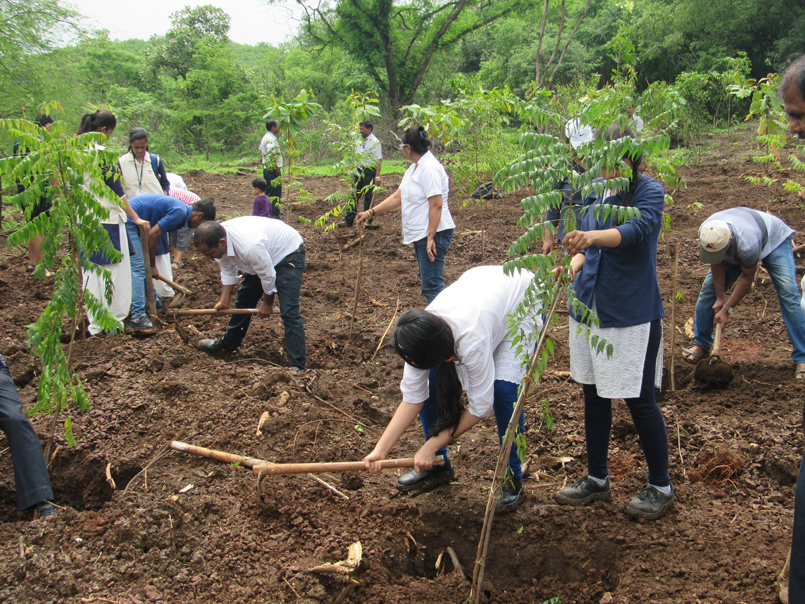Reaffirming its commitment towards fostering sustainable development in the community, Tata Motors, in association with the BAIF Institute for Sustainable Livelihoods and Development (BISLD), piloted the Wadi model in Jawhar tribal region of Palghar, Maharashtra. This holistic model has significantly enhanced the livelihoods of 2,000 farmers by increasing food security, generating sustainable income, providing healthcare facilities, and sharing technical know-how to improve the quality and the quantity of the farm produced. Since the inception of this programme, these farmers have planted over 2.7 lakh trees and conserved over 1000 acres (265 hectares) of soil. Developed through participatory planning with tribal communities in three-gram panchayats in Jawhar, this Wadi model has gained tremendous success and is now spreading across other neighboring areas in Palghar.
To date, under this model, around 60 fruit trees (mainly mango and cashew) and 250 to 300 forestry trees (combination of timber, fodder and NTFP tree species) have been planted on 1 acre of underutilized land owned by each participating family. Tata Motors has developed 6 nurseries in Jawhar to provide each family with saplings. The Government on the other side supports the farmers under schemes like MGNREGA to assist them in earning wages for tasks such as digging, pitting, gap filling, etc. Farmers are further entrusted with the responsibility of taking care of plants.

The model also addresses a wide range of environmental needs such as tree plantation, soil conservation, water resource development, moisture conservation, improved nutrition and quality of life. In addition, agricultural product aggregation, processing and marketing initiatives introduced into the current model have enhanced the capacity-building amongst farmers. Benefits of this model are also extended to landless families through small enterprises like sapling and fruit plant nurseries, vermicompost production, petti shops, and more.
Commenting on this remarkable achievement, Mr. SJR Kutty, Chief Sustainability Officer, Tata Motors, said, “Tata Motors firmly believes in the need to constantly work to bring a lasting positive impact to the community and the environment. Our Wadi model aims to promote sustainable livelihoods while strengthening environmental resilience, and has achieved significant results over the last few years. We will continue to work on this front in earnest, incorporating more meaningful changes to increase impact, continuing to tread decisively towards a more sustainable future.”
To continue efforts under the Wadi model, Tata Motors has committed to planting five lakh trees and will be providing opportunities in existing project areas to farmers through BISLD. Another 2000 farmers have been identified as proposed beneficiaries and will be provided with technical support and nurseries. Through these efforts, Tata Motors aims to transform 2000 acres of waste land into cultivable land, as well as assist each farmer enrolled in the programme to develop a stable means of sustainable livelihood.
About Tata Motors
Part of the USD 128 billion Tata group, Tata Motors Limited (NYSE: TTM; BSE: 500570 and 570001; NSE: TATAMOTORS and TATAMTRDVR), a USD 37 billion organization, is a leading global automobile manufacturer of cars, utility vehicles, pick-ups, trucks and buses, offering extensive range of integrated, smart and e-mobility solutions. With ‘Connecting Aspirations’ at the core of its brand promise, Tata Motors is India’s market leader in commercial vehicles and amongst the top three in the passenger vehicles market.
Tata Motors strives to bring new products that fire the imagination of GenNext customers, fueled by state of the art design and R&D centers located in India, UK, US, Italy and South Korea. With a focus on engineering and tech enabled automotive solutions catering to the future of mobility, the company’s innovation efforts are focused to develop pioneering technologies that are sustainable as well as suited to evolving aspirations of the market and the customers. The company is pioneering India’s Electric Vehicle (EV) transition and driving the shift towards sustainable mobility solutions by preparing a tailor-made product strategy, leveraging the synergy between the Group companies and playing an active role liasoning with the Government in developing the policy framework.
With operations in India, the UK, South Korea, Thailand, South Africa and Indonesia, Tata Motors’ vehicles are marketed in Africa, Middle East, South & South East Asia, Australia, South America, Russia and other CIS countries. As of March 31, 2022, Tata Motors’ operations include 86 consolidated subsidiaries, two joint operations, four joint ventures and 10 equity-accounted associates, including their subsidiaries, in respect of which the company exercises significant influence.
source code:-https://www.tatamotors.com/press/tata-motors-transforms-livelihoods-of-2000-farmers-in-maharashtra/



